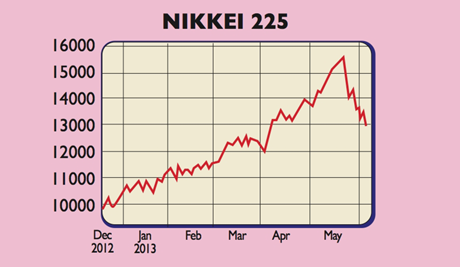Get the latest financial news, insights and expert analysis from our award-winning MoneyWeek team, to help you understand what really matters when it comes to your finances.
You are now subscribed
Your newsletter sign-up was successful
Want to add more newsletters?

Twice daily
MoneyWeek
Get the latest financial news, insights and expert analysis from our award-winning MoneyWeek team, to help you understand what really matters when it comes to your finances.

Four times a week
Look After My Bills
Sign up to our free money-saving newsletter, filled with the latest news and expert advice to help you find the best tips and deals for managing your bills. Start saving today!
Japanese stocks fell on Wednesday as traders registered their disappointment with the reforms from prime minister Shinzo Abe. This is the "third arrow" of three in the economic strategy known as Abenomics'. The package of reforms follows on from earlier moves to weaken the yen via quantitative easing (QE), and to help boost the Japanese economy through higher government spending. So far, Abenomics' has helped lift Japan's benchmark Nikkei 225 share index by 53%, while pushing the yen lower against the dollar. But the market has slipped back by about 15% in recent weeks.
What the commentators said:

But while it's true that "earlier exuberance was excessive", says Julian Jessop of Capital Economics, there is "an increasing danger that the pendulum may now be swinging too far towards pessimism". The success of Abenomics' is by no means guaranteed, but it "surely represents the right mix of policies to tackle Japan's problems".
MoneyWeek
Subscribe to MoneyWeek today and get your first six magazine issues absolutely FREE

Sign up to Money Morning
Don't miss the latest investment and personal finances news, market analysis, plus money-saving tips with our free twice-daily newsletter
Don't miss the latest investment and personal finances news, market analysis, plus money-saving tips with our free twice-daily newsletter
Get the latest financial news, insights and expert analysis from our award-winning MoneyWeek team, to help you understand what really matters when it comes to your finances.
MoneyWeek is written by a team of experienced and award-winning journalists, plus expert columnists. As well as daily digital news and features, MoneyWeek also publishes a weekly magazine, covering investing and personal finance. From share tips, pensions, gold to practical investment tips - we provide a round-up to help you make money and keep it.
-
 MoneyWeek Talks: The funds to choose in 2026
MoneyWeek Talks: The funds to choose in 2026Podcast Fidelity's Tom Stevenson reveals his top three funds for 2026 for your ISA or self-invested personal pension
-
 Three companies with deep economic moats to buy now
Three companies with deep economic moats to buy nowOpinion An economic moat can underpin a company's future returns. Here, Imran Sattar, portfolio manager at Edinburgh Investment Trust, selects three stocks to buy now

